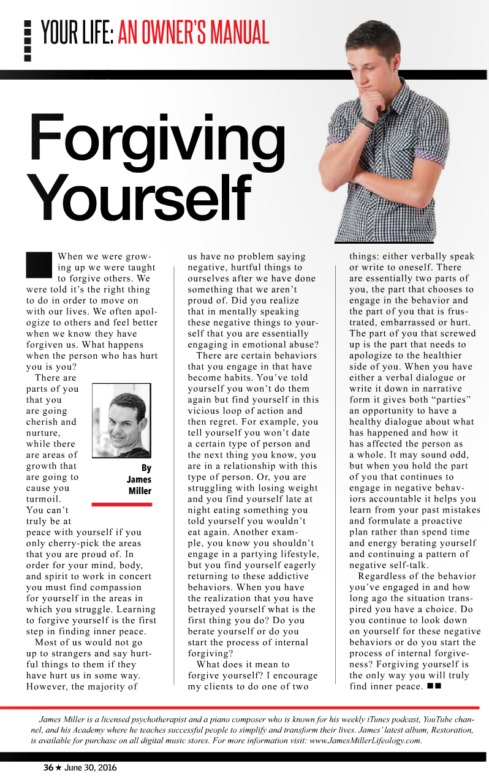When we were growing up we were taught to forgive others. We were told it’s the right thing to do in order to move on with our lives. We often apologize to others and feel better when we know they have forgiven us. What happens when the person who has hurt you is you?
There are parts of you that you are going cherish and nurture, while there are areas of growth that are going to cause you turmoil. You can’t truly be at peace with yourself if you only cherry-pick the areas that you are proud of. In order for your mind, body, and spirit to work in concert you must find compassion for yourself in the areas in which you struggle. Learning to forgive yourself is the first step in finding inner peace.
Most of us would not go up to strangers and say hurtful things to them if they have hurt us in some way. However, the majority of us have no problem saying negative, hurtful things to ourselves after we have done something that we aren’t proud of. Did you realize that in mentally speaking these negative things to yourself that you are essentially engaging in emotional abuse?
There are certain behaviors that you engage in that have become habits. You’ve told yourself you won’t do them again but find yourself in this vicious loop of action and then regret. For example, you tell yourself you won’t date a certain type of person and the next thing you know, you are in a relationship with this type of person. Or, you are struggling with losing weight and you find yourself late at night eating something you told yourself you wouldn’t eat again. Another example, you know you shouldn’t engage in a partying lifestyle, but you find yourself eagerly returning to these addictive behaviors. When you have the realization that you have betrayed yourself what is the first thing you do? Do you berate yourself or do you start the process of internal forgiving?
What does it mean to forgive yourself? I encourage my clients to do one of two things: either verbally speak or write to oneself. There are essentially two parts of you, the part that chooses to engage in the behavior and the part of you that is frustrated, embarrassed or hurt. The part of you that screwed up is the part that needs to apologize to the healthier side of you. When you have either a verbal dialogue or write it down in narrative form it gives both “parties” an opportunity to have a healthy dialogue about what has happened and how it has affected the person as a whole. It may sound odd, but when you hold the part of you that continues to engage in negative behaviors accountable it helps you learn from your past mistakes and formulate a proactive plan rather than spend time and energy berating yourself and continuing a pattern of negative self-talk.
Regardless of the behavior you’ve engaged in and how long ago the situation transpired you have a choice. Do you continue to look down on yourself for these negative behaviors or do you start the process of internal forgiveness? Forgiving yourself is the only way you will truly find inner peace.
James Miller is a licensed psychotherapist and a piano composer who is known for his weekly podcast, YouTube channel, and his Academy where he teaches successful people to simplify and transform their lives. James’ latest album, Restoration, is available for purchase on all digital music stores. www.JamesMillerLIFEOLOGY.com.


 We all get overwhelmed and sometimes don’t know what to do. LIFE LESSONS is your new “go-to” book to help you navigate life.
We all get overwhelmed and sometimes don’t know what to do. LIFE LESSONS is your new “go-to” book to help you navigate life.